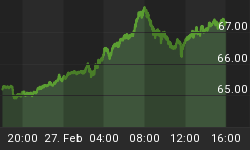IMF Managing Director Christine Lagarde told Bloomberg Television's Tom Keene this morning the U.S. "has been a safe haven and that has been for a long time." She went on to say "It's a key destination in many ways. It shouldn't be damaged as a result of what is going on at the moment."
Lagarde on whether the U.S. can bring global GDP growth back into recession:
"We certainly hope it does not. The U.S. Economy is doing well at the moment. It is generating growth. The housing market is picking up. There are good signs on the U.S. horizon. Which is good news for the world. If there is no quick resolution for both the debt ceiling issue, which is far worse than the other one, and the government shutdown, that will be very negative consequences for the U.S. economy and spill over affects which means negative consequences for the rest of the world. I am not prejudging how it should be addressed or resolved. It is not for the IMF to say. We know the consequences would be dear. And we can do away with them"
On where is the U.S. leadership and where can the U.S. act responsibly:
"The leadership is in [Washington D.C.]. The whole economy is everywhere in the United States. The leadership has to be demonstrated in this city. To the extent that is has very serious economy consequences for the largest economy in the world and consequences outside the U.S. which could precipitate another crisis if it was to last longer. It needs to come from here."
On how does she fight off policy fatigue:
"We need cooperation. There are lots country-specific situations. And that is what we are seeing. We are seeing a dual movement. Where the Policy needs to be put in place by countries is going to be country-specific. It will depend on the fundamentals, the strength of the economy, on the age of society of the integration of women, on the level of unemployment of young people and so on and so forth. At the same time, there has to be cooperation because there are vast connections between those economies. Policy fatigue, we better take a remedy against it and quickly because there will have to be policy commitments, obligations going forward. The economies are changing. We have seen convergence happening and that requires policy making and implementing."
On whether there are too many "photo-shoot meetings" like the G20 and Davos:
"Let me stress one thing. We are focusing on country-specific issues because each member deserves special attention. We are very much working on the interconnections, very much working on the spillover effects, very much measuring what the effects of one particular policy and one particular country will have on the rest of the world. We are in a global village like it or now and we have to take it into account and that's why people have to meet. They have to act and do the job as well."
On whether big U.S. themes and policies affect emerging markets:
"Yes it does, no question about it and it proves the point that It is vastly interconnected. The announcement of potential decisions down the road have an effect on capital flows. You have to look under the skin of each economy to see whether this is truly the result of potential tapering or whether it's not that plus issue about the structural situations of each economy. We've seen it over the summer. Some countries have taken a hit much harder than other countries."
On whether she shares one person's optimism about the American experiment even with the challenges in Washington:
"I share that optimism because I believe the ground roots of the U.S. Economy is vibrant and is turning around and is going to generate growth. It should not be prevented from doing so because of uncertainty. Investors need certainty. If they are in this realm of fiscal uncertainly they don't know what tomorrow will be about and how it will be resolved. They are cautious. They keep their money safe and they don't know exactly where to put it. One more thing: The U.S. has been a safe haven. That has been a long time. It's a key destination in many ways. It should not be damaged because of what is going on at the moment."
On whether she has spoken to Janet Yellen since her appointment:
"I left a message on her voice message system because she was too busy and I don't want her to respond because she is too busy and that's great."
On what will the IMF project do this year for women:
"What we are saying and what we are observing, there is a huge potential out of women if they joined the market if they joined the job market, if they participate in the economy. We are trying to measure that. We are trying to encourage policymakers to make space and choice available to those women."















